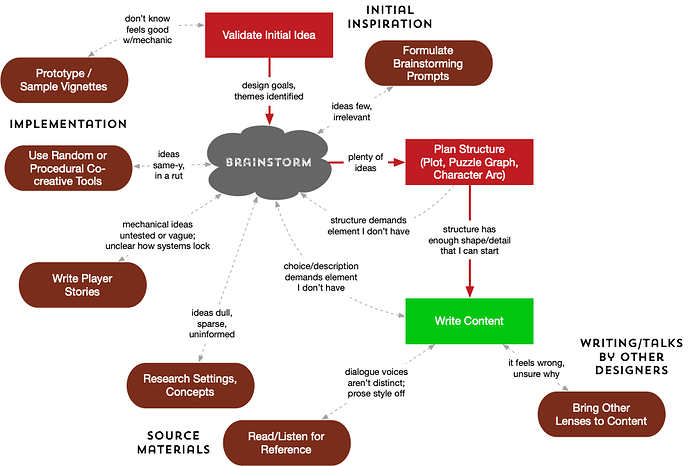Since @emshort was kind enough to drop a couple of follow up links, I thought maybe I could pull some of what she said to solidify my own understanding and also to bring some of the important content that answered my question out into the thread.
Many of the ideas fall in the realm of Brainstorming, which is an idea I was already familiar with, but more specifically, a strong idea in the article is that world-building books give you a bunch of standard questions about a game-world for world building, but she got tired of doing the same kind of homework for every game world she was working on so she would Choose Provocative Questions:
I start with the core of the project — the mechanic that’s driving the game, the theme that’s animating the story — and come up with a new, bespoke set of questions that’s designed to surface emotions, attitudes, and conflicts. Then I ask and answer those questions, character by character or piece by piece in the story.
(emphasis mine)
(However, she does offer a list of more standard worldbuilding resources as a starter:)
She gives the following example:
Say I know the inciting incident of the story is a huge, life-altering disaster. I might then ask questions like
- What does this character miss most about the time before, and what would he give to get it back?
- Whom does this character blame for the disaster, and how do they act out that blame?
- What lie does this character tell herself about what would have been if the disaster hadn’t interrupted her life?
- What is the safest place in this character’s life now, and what is threatening that safety?
And also:
You can also use provocative questions to come up other story elements, like events or setting details:
- What demographic of people has suddenly profited from the disaster, and how are they using their newfound power?
- What event gave people a brief, false hope that disaster might be averted?
She also talked about using Research and Observation as a tool to generate complicating ideas:
Getting some hands-on experience with a setting or process is great if you have the opportunity to arrange it. (An afternoon touring a marble sculpture workshop heavily informed Galatea – even though I didn’t tour it for that purpose.)
When I’m consciously doing an activity as research, I go in with a few questions in mind, but don’t limit myself to just those observations.
She also talked about the power of alternating between Research and Brainstorming.
Finally, she had an actual flowchart to map techniques to different problems you might be having with your story or game, which is especially valuable:
So that was all pretty close to what I was looking for, to be sure, and many thanks to @emshort, I didn’t naturally find that post. But I would STILL call many of these techniques DEEPENING a world, but only some of them actually seem to COMPLICATE it. And the things that seemed to COMPLICATE it the most are her own custom written questions. I guess getting good answers depends on good questions.
